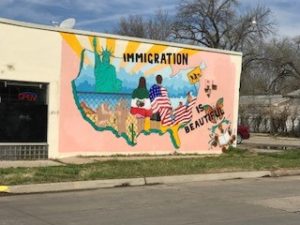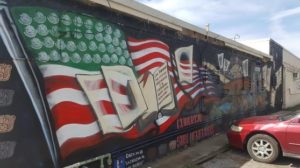By Randy Lopez, Program Officer, Wyandotte Health Foundation & 2018 PLACES Fellow

Last week, I was hanging at my parents’ house with my mom and dad. As we often do, we were sitting in the kitchen. I don’t know why we always pick the kitchen; it’s one of the smaller rooms in their house but we always decide that’s the room in which to be. Maybe it has something to do with the proximity of the food, but in my family the kitchen is the core gathering place, whether we are eating or not.
On this particular Wednesday, my parents were reflecting on their immigration story. Both of my parents were born and raised in Mexico and were brought to the United States of America by their parents. My mom said, “Honey (she calls my dad honey…it’s kind of cute). Honey, we were blessed. Our parents were able to move to the U.S. and bring us here. And we were able to create a life and have a family with opportunities.”
What prompted this comment from my mom? Well, on TV at that same moment was a Univision report from the U.S.-Mexico border on the harsh and tense conditions faced by families trying to cross. They were reporting on the inhumane separation of families which has now turned into the inhumane jailing of mothers, fathers, and children.
For my mom, the thought of having her family ripped apart, her children taken from her, because of “lack of status” is just unimaginable. She was reflecting on her journey, my father’s journey, and our family’s journey to where we are now.
I am blessed to be in a position that I don’t have to fear whether I will be deported or separated from my family. I don’t know the anxiety of wondering whether my parents will be home when I visit due to “lack of status” in this country.
But I also know that I do hurt when I hear of the unjust, inhumane, hateful, discriminatory and deeply rooted racist practices that we see and hear about every day.
I wasn’t sure what to expect through this PLACES Fellowship. I’ve been through may different “leadership trainings” and professional development experiences, but many fell short of getting to the root causes of racial and economic injustice in our communities.
I want to learn about how I can incorporate the work of racial equity, in a meaningful way, into my everyday work in philanthropy and beyond. I want to learn about ways to have real conversations and dialogue about race and racism. Most importantly, I want to learn what our response to our communities’ needs will and should look like.
I want to know how best to use my voice as an individual, as an employee of a foundation, and as a Latino man to stand up against hate and tyranny, learning how to turn the conversations into solutions driven conversations focused on love, respect, and equity.
Our 2018 PLACES Fellows cohort met for the first time on our site visit to Wichita, Kan., which happens to be not far from Kansas City, the place I was born, raised and now work as program officer for the Wyandotte Health Foundation.
Day 1 of the Fellowship: Damn. We dove right into a root cause analysis of racial and economic inequity. I won’t get into details, but the conversation was intense yet inspirational and intentional.
18 Fellows from all walks of life, with all types of lived experiences and views on life, all gathered in a room talking about the work of racial equity. This was gonna get good, really fast.
A few (out of many) takeaways for me:
- Racial equity is inclusive, systemic, and focuses on root causes. It is on all of us, together, to lift this work and not be afraid to have deep conversations with each other, especially around real root causes of inequity.
- Communities know the answer. Often as funders we want to give answers. That’s not the point. Communities know the problems in their own community and have ideas about solutions that make sense and work. We have to be willing to listen, support, and be fully present.
- Start with self: I have to be willing to look at what my role is and be willing to make transformative change before expecting anyone else to do the same.

We met a community in Wichita that is really embracing these themes. A young man named Armando Minjarez, an immigrant, activist, artist, and engaged community member working towards healing through art was our local guide. We visited some of the community murals, which, sure, he lead, but he’ll be the first to tell you that it was really the community who spearheaded and truly took the lead. Art, he said, has inspired community conversations and has sparked continued work to bring the community together. His newest project will reflect community conversations on race between black/brown communities and will tell their stories through murals. The work of racial equity is incremental and comes from a place of love and inspiration.
I mentioned I wasn’t sure what to expect, but let me say I was not disappointed with this first gathering. Difficult conversations that set the tone which come from a place of love for community is where we must start. That’s how we make changes in ourselves, in our work, in our workplace (philanthropy), and ultimately in our communities. That’s how we end family detentions, families being separated, oppressive laws, and policies that overwhelmingly affect our vulnerable communities of color.
I can’t wait to see what the rest of the year will bring.
Catch up on our last Going PLACES blog here.
About the Author

Randy Lopez, Program Officer, Wyandotte Health Foundation
Randy Lopez was named Program Officer for the Wyandotte Health Foundation in Kansas City, KS. He is responsible for program development and grants administration in the Foundation’s funding priority areas of Primary Care, and Early Childhood Trauma, as well as for special initiatives. In addition to grantmaking, Lopez plays an important role in increasing collaborative partnerships as well as community awareness and engagement.
Featured image: Mural in downtown Wichita, Kan., depicting the struggle with immigration bureaucracy in the U.S. Photo credit: Randy Lopez.
